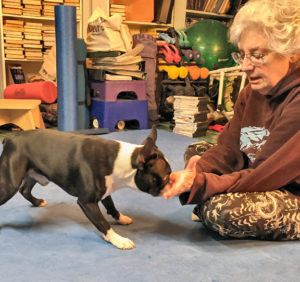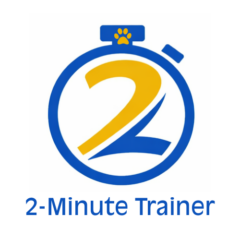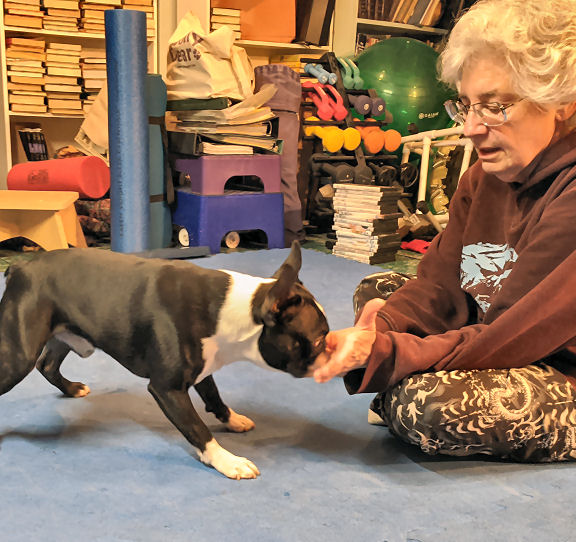Do you talk to your dog? If not, why not? Dogs need your feedback especially when you’re playing training games, but other times, too.
Consider this dialog:
Trainer: What day is today?
Student: Tuesday?
Trainer: What day is today?
Student: The seventh?
Trainer: What day is today?
Student:…..
Even if all of the student’s answers are right, by persisting with the same question without feedback, the trainer is causing doubt and frustration. If your dog is struggling to understand what you want, it’s not the dog’s fault. Your role is to encourage your dog to keep trying, offering feedback to keep them in the game. And find a way to clear up any confusion. We’ve encouraged you to talk to your dogs for years, and still our classes can be much too quiet.
Dogs want to play with you
It’s perfectly understandable that you don’t want to look foolish in public. But consider: do you look sillier with high-energy dog training with a responsive, engaged dog? Or with a low-key public session where your dog ignores you?
One of the phrases our students hear most often and are probably sick of is “Be more fun! Be more interesting!” In all honesty, your dog shouldn’t find anything or anybody more interesting than you. You should be your dog’s focal point, because they have more fun with you than anything else on the planet.
When you’re more animated, more enthused, and more focused for those 2-Minute sessions, your dog will be, too. If your dog doesn’t understand what you want, increase your feedback, don’t eliminate it! Give your dog encouragement: “You can do it, I know you can!” “Try something else, buddy. That wasn’t it, but I know you can get there!”
If your dog doesn’t hear good, positive feedback from you – what motivation do they have to keep trying?
Stay engaged
If you’re not feeling it on a particular day, don’t train. It’s really that easy. The session wouldn’t be productive anyway, so just don’t bother. You don’t want to get aggravated, you don’t want to frustrate your dog. So give it a bye. If your mood changes later that day, that’s when you give your dog a couple of minutes. And if it doesn’t, that’s okay, too.

One of the complaints we hear about people’s dogs is that the dogs are more interested in “stuff” in their environment than in their people. It’s not the dog’s job to find you interesting. It’s your job to be interesting to your dog. That doesn’t mean putting on a show. It means paying attention to your dog, not your phone, when you’re out for a walk. And when your dog spots something interesting, engage with them! If it’s something you’d rather they not focus on, redirect their attention with a game or a toy or conversation. If it’s something worth checking out – go do that and be part of the exploration.
That’s the key. Be a part of everything your dog does. Interact, talk to them. Let them know they’re not just a “thing” you take out and play with when it’s convenient. Dogs need your feedback. The more you let your dog know they matter to you, the more you’ll matter to your dog.


Thank you for this great reminder! It’s not our dogs job to find us interesting….a very good lesson!